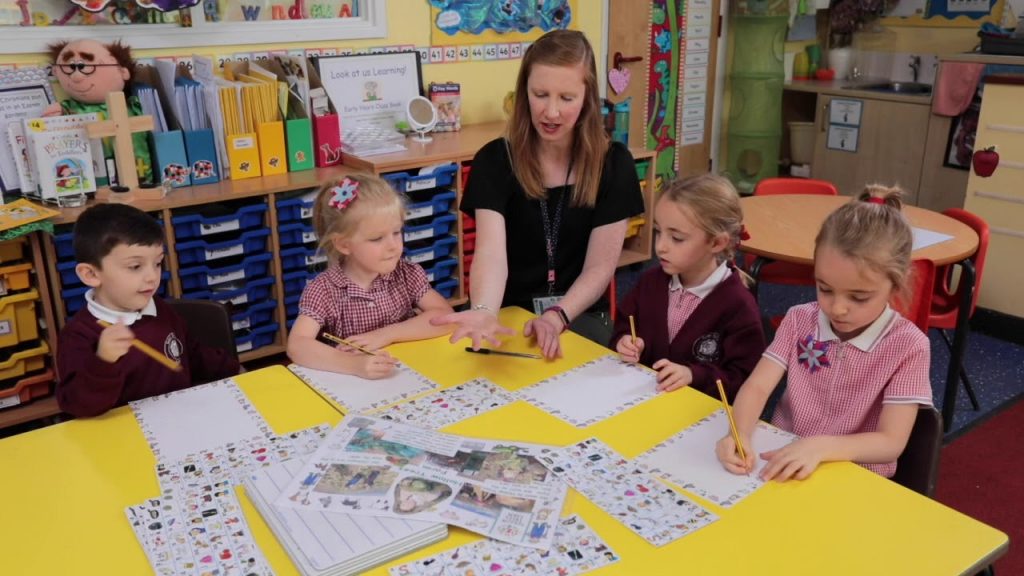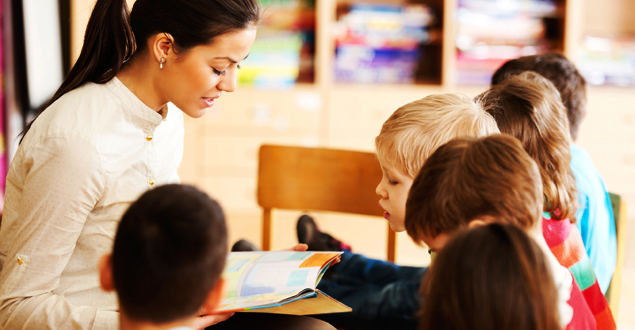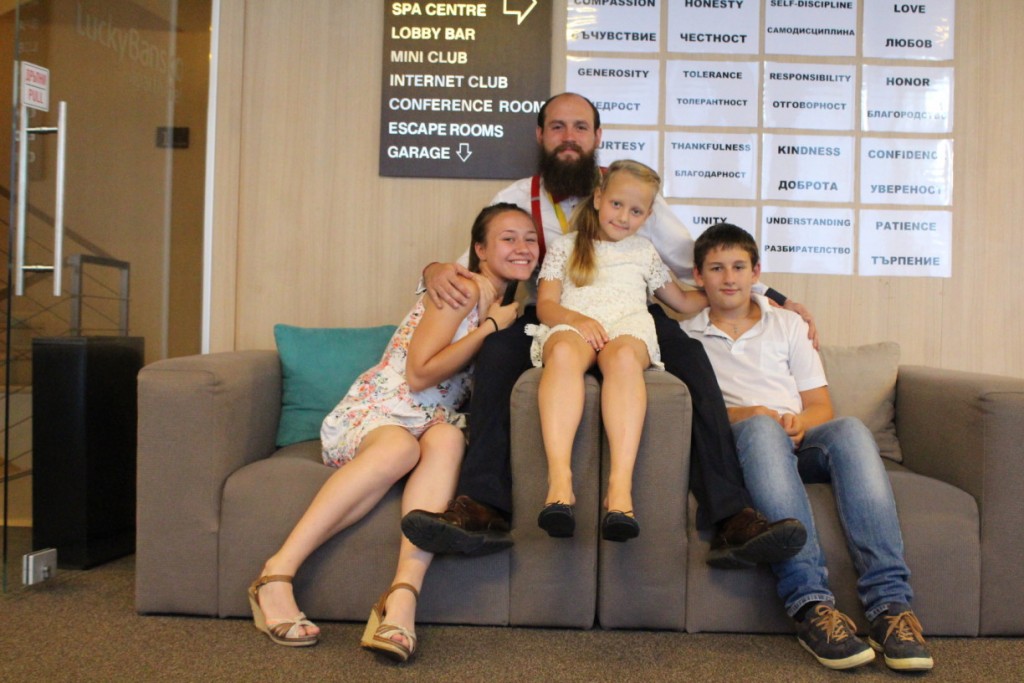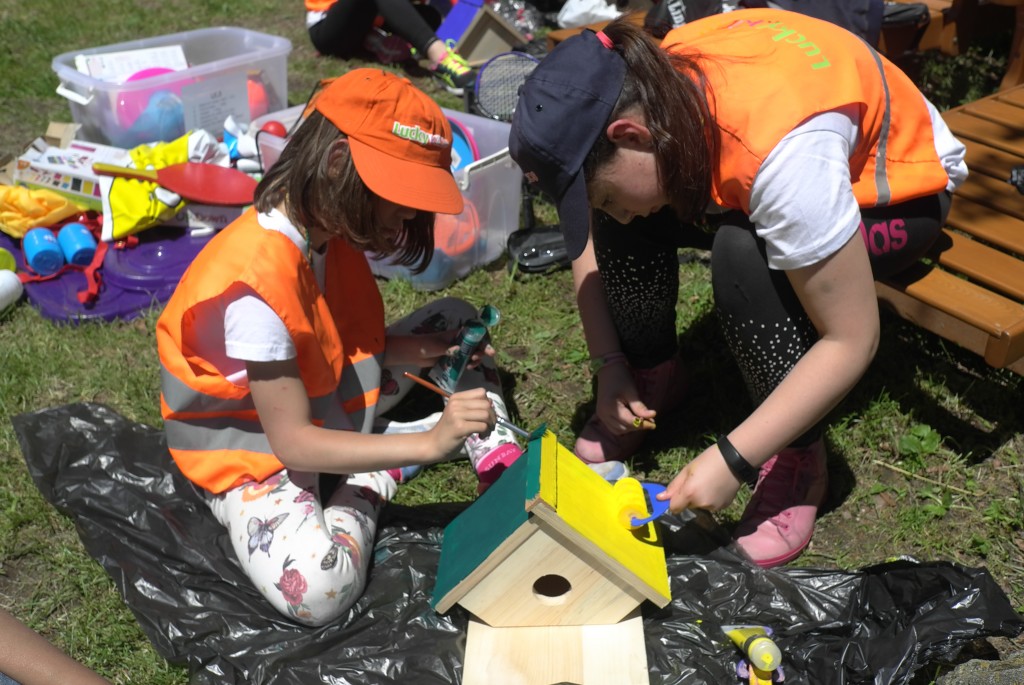In LuckyKids we use an innovative English language learning system for children at preschool age – „Play and Talk with Echo”, which is designed to set the foundations of foreign language teaching. “Play and Talk with Echo” programme system is based in the following methods, principles and approaches for proper language acquisiton:
- games;
- listening and speaking;
- comprehensive listening;
- songs and dances;
- connecting education with positive emotions;
- alternating activities during the educational process;
- love and care for the children;
- building a system of values and virtues;

The child with their unique world, unlimited quests and perceptions is in the centre of “Play and Talk with Echo“ programme system. The system follows the ideology of simplicity and ease as well as of entertainment through learning and making (easy and simple).
We work with “Play and Talk with Echo“ system and its elements:
- Practical guidelines for the English language teacher;
- Word bank for each lesson, which the teacher can use to visualize words and expressions and which enriches the child’s passive and active vocabulary;
- Poems and songs /these are listed in each lesson; the appendix contains the complete lyrics, which on its hand facilitates the teacher’s work during the pedagogical situation/
- Individual portfolio for individual work of the children age 5-7 years;
- Poster boards: Letters, Emotions, Calendar Time; CD with all the dialogues for each lesson.
The implementation of “Play and Talk with Echo“ programme system will lead to the integration of foreign language teaching and the educational programme for preschool education and school readiness.
Motivating the child to speak in the foreign language is a challenge well known in the pedagogical practice. In order that the child is provoked to use the foreign language and to look for social contacts through it, it is important that the situation in which the child is put to have personal significance for them. It is also important to provide extra sources of speech stimulation in order that the language is made a priority – such as games and the child’s inner calling toward the extraordinary.
The teacher is the mediator between the child and the foreign language. The teacher introduces the child to the secrets of the language with love, patience, tolerance, freedom and sense for aesthetic beauty, expecting incredibly positive results. Every word we say creates the future generation. The teacher is role model, and their values develop a system of values for the children.

The teacher puts the child in the centre of the educational process and provides an opportunity the child to be the leader. “Play And Talk With Echo“ programme system allows the child to turn the knowledge and skills acquired in their mother tongue into a base for learning English language. The child themselves will show their own capacity without being given limits and being put in frames by the teacher. During the pedagogical situation, the teacher is the leader who guides the child. The teacher is aware that the specific language material needs to touch all senses of the children /sight, hearing, touch, taste, smell/, in order to guarantee the acquisition of the information which depends on the child’s style of learning.
The teacher uses non-violent methods of communication while working with children and the teacher themselves are participants in the learning process. The teacher of “Play and Talk with Echo“ knows that nothing can be learned mechanically. The teacher shows the children to develop their full potential for knowledge acquisition. The teacher helps and encourages the children’s development, they also teach the children how to discover and apply knowledge by themselves. The teacher is a helper and a guide.
The role of the teacher is extremely important – the teacher is “the engine of the sygestopedic machine” (Gateva, 1990, p.91). The teacher is a role model, a producer, a “consultant” and a knowing friend, who even does not correct their mistakes /the teacher can delicately say the proper word/, because the aim is the children to feel at ease so that they are comfortable to speak. The teacher of “Play and Talk with Echo“ believes in the unlimited potential of Child’s intellect.
The teacher of “Play and Talk with Echo” is a creative person who appreciates the freedom in acquiring information. The teacher understands the personal potential of each child and respects the child’s right of choice. The teacher is always ready to give the child a choice of three options, because the ready model turns into a barrier for the child and deprives the child from their right to choose.
“Play and Talk with Echo” recommends some main “helpers” which at the same time serve as motivators and agents of children’s interests.

Echo – the main character and THE MAIN TEACHER
Echo is with the children and the teacher all the time. Echo cannot be seen or touched, Echo is the story-teller and the MAIN TEACHER in the lesson. During the entire lesson the teacher communicates through Echo by making a beak-like gesture with their hand in order to attract the attention.
Echo is a magic character and satisfies child’s necessity of meeting the unknown. The role of Еchо is very important because it attracts the Children’s attention – thus it not concentrated in a determined person but a flexibility of perceptions is provided. Echo is in the centre of the interaction and at the same time apart from it, as an important corrective factor of the work and the behaviour of the Children. Echo takes away from the teacher their role of an evaluator of the children achievements in such a way that the authority of the teacher is preserved.
The teacher turns into an entertaining story-teller and a valuable mediator. The role of Еchо helps the child build their own ”echo” – an own point of view, a perception and an understanding. The teacher delivers information through Еchо and thus they correct the children. Echo helps the children learn through their own experience and without any limits.
Calendar Time – board
Calendar Time is a special routine of “Play and Talk with Echo” programme system. Calendar Time is the beginning of the English language situation for the children. During Calendar Time the teacher gathers the children to sit on the floor /crossed legs, hands on their knees/ and introduces the forthcoming lesson to them. Calendar Time occurs in beginning of each pedagogical situation. During Calendar Time the teacher and the children talk about the following: the day of the week, the month, the date, the weather in the current day.
The time concepts of „yesterday, today, and tomorrow” are worked out. All of the above are visualized on a special board.. Calendar Time provides a wonderful opportunity for the child to develop a rich vocabulary on one hand, and on the other to stimulate the impact of the language, on a conscious and subconscious level.
Hat – the hat transforms the identity of the teacher and helps them become somebody else depending on the lessons’ goals /story-teller, translator, character/. The teacher can choose a role to play /for example – an owl – the symbol of wisdom, etc./. With the hat and into the role, the teacher comes out of the demanding position “I am the teacher and you are the child and you learn”. The message of the hat is: “We are learning together – I am one of you”.
The Magic Bag – it brings the moment of the surprise

Children love surprises and feel excited by them. Children realise that the teacher always brings surprise for them and they eager for every meeting with the teacher. The teacher of “Play And Talk With Echo“ is really well prepared in order to provoke the children’s curiosity and interest.
- Worksheets – these are printed in black and white, in order that the child is provided an opportunity to express themselves. The colours on the worksheets come from the children. The idea is that the things come into being through the child’s eye. Thus the children become creators. The child has “guided freedom” and when receiving the worksheet, they start working by associations, leaded by their inner perceptions and feelings.
- Intonation – an alternation of the three tone levels is ecommended when talking with the Children and adults – ascending, descending and moderate /there is no limitation for the sequence of alternating/. Different children have different levels of perception of the intonation. Using the three tone levels the teacher “gets to” every child.
- Background music – we prefer Mozart, as his music is created in the rhythm of the heart beating. It is good idea the music to be quiet. The classic music is beautiful, it not only calms down but educates aesthetically.
- The atmopsphere – it is a very important part of the working environment. “Play And Talk With Echo“ believes in the influence of the creativity of the environment – a combination of warm and bright tones, many demonstration materials, children’s works posted on the walls and anything else that can help the child to receive information for the world around. In the process of compiling of the visual materials, the teacher can make them colourful, speaking for themselves – this is a suggestia – something that is memorized permanently but non-violently. (“To reach the stage of inspiration which allows the learning to be done in a nice atmosphere”, from “The Seven laws of Suggestopedia, prof. Lozanov/.
“Play And Talk With Echo“ programme system is structured in a way that activities are offered through senses and emotions, through everything heard, seen and experienced.
What we use with “Play and Talk with Echo”
Positive words vocabulary – words are the invisible arrows that touch our personality and can hurt for life. That is the reason why we practice daily some often used words which need to be avoided:
- Terrific – extraordinary, wonderful, amazing;
- Bad – bad is the action or the behaviour performed by the Child – not the Child themselves;
- difficulty– challenge;
- addiction – calling;
- deadly – wonderful;
- smell – scent perfume etc.
The system provdes techniques to overcome the natural tiredness of Children:
- Water: a jug of water and cups are provided in the classrooms. The water drinking is a routine for children in oro avoid them to become restless, yawning.
- Exercises: we alternate the activities each 5-7 minutes, in cas the children are restless, hyper-active or lethargic. As time passes the children understand these exercises help them and start practicing them by themselves.
Play and Talk with Echo is a working system with our younger camp participants who enjoy the light and friendly way of learning provided by the concept, methods and the curriculum of the learning system. The results are due in short terms and the achievements are amazing.

